|
|
|
Sort Order |
|
|
|
Items / Page
|
|
|
|
|
|
|
| Srl | Item |
| 1 |
ID:
073205
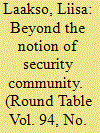

|
|
|
| 2 |
ID:
177571
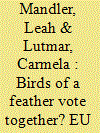

|
|
|
|
|
| Summary/Abstract |
UN General Assembly (UNGA) voting is non-binding, unlike voting in the Security Council (UNSC), yet is considered to reflect states’ interests. This article attempts to explore, compare, and explain patterns in UNGA voting of two regional organisations (ROs) on Israel-related resolutions, and/or issues that are of importance to Israel. Israel has been a unique case when it comes to the UN, which has shown pervasive hostility towards the Jewish state over the past decades (e.g. 83 of the 97 UNGA resolutions criticising countries in 2012–15 [or 86%] were directed against Israel). While most researchers agree that ROs differ in the level of their group vote uniformity, this article argues that states’ voting on resolutions related to Israel also varies within ROs and over time. As such, it sheds light on internal changes within the examined ROs (the Arab League and the EU) and shows important differences among members of these organisations.
|
|
|
|
|
|
|
|
|
|
|
|
|
|
|
|
| 3 |
ID:
111551
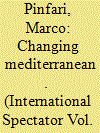

|
|
|
|
|
| Publication |
2012.
|
| Summary/Abstract |
This article discusses the role played by the European Union, African Union and Arab League in the recent revolutions in Tunisia, Egypt and Libya. It focuses in particular on the use and impact of political and economic conditionality, the decision-making processes within each organisation and the inter-regional forums created to deal with the crisis. The analysis acknowledges the increasingly active and vocal role played by regional organisations in the so-called 'Arab spring', but it highlights not just that they had few legal powers to intervene in these crises, but also that they seemed very reluctant to use any form of political or economic conditionality. It also reveals that the main purpose of inter-regional forums was arguably not to generate consensus internationally but rather to manage dissent. As such, the article encourages a reflection on the specific challenges and opportunities that North Africa and the Mediterranean region pose to regional conflict management.
|
|
|
|
|
|
|
|
|
|
|
|
|
|
|
|
| 4 |
ID:
149506
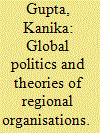

|
|
|
| 5 |
ID:
117893
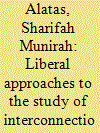

|
|
|
|
|
| Publication |
2013.
|
| Summary/Abstract |
Since 2004, with the new premierships of Manmohan Singh, in India, and Abdullah Badawi, in Malaysia, India and Malaysia have been playing active roles in decision-making on many issues, regionally through regional blocks. Despite these positive developments, the area where there is a pressing need for the two countries to discuss and act upon concerns environmental security, mainly freshwater scarcity and security. Both India and Malaysia face worrying proportions of freshwater shortages, due to a number of reasons, including increasing individual consumption, industrialisation and poor agricultural practices. This article discusses how both India and Malaysia, as well as their roles in four regional organisations, can recognise the problem of freshwater scarcity and security and propose solutions for adaptation and mitigation. The theoretical framework within which this discussion is couched in is liberalism.
|
|
|
|
|
|
|
|
|
|
|
|
|
|
|
|
| 6 |
ID:
140966
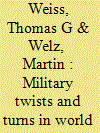

|
|
|
|
|
| Summary/Abstract |
Russia’s challenge to the post-cold war order, and the rise of Islamic State have resulted in a call for increased military spending among NATO members. Despite the increased demand for UN peace operations, any expansion is unlikely to benefit the world organisation. Instead we see an increasing reliance upon regional organisations like the African Union, European Union and NATO, in particular, for robust peace operations. An analysis of Western states (France, Germany and the USA) suggests that future investments in weaponry, technology and staff will primarily benefit NATO and the EU, but not the United Nations.
|
|
|
|
|
|
|
|
|
|
|
|
|
|
|
|
| 7 |
ID:
075146
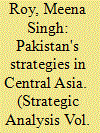

|
|
|
| 8 |
ID:
157730
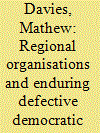

|
|
|
|
|
| Summary/Abstract |
Instead of asking whether regional organisations can promote democracy, a well-established conclusion, this article asks what type of democracy regional organisations can promote. Where their commitments to democracy are weak, regional organisations can promote the transition away from authoritarianism but cannot drive that process to completion with the creation of embedded liberal democracies. Under such circumstances regional organisations serve as regimes of bounded toleration, and can provide regional linkages that sustain defective democracies. Through examining the relationship between the Association of Southeast Asian Nations and Myanmar, three supporting roles are identified; regional legitimacy, defence from external pressure, and future-oriented accommodation. The presence of these linkages between defective democracies and regional organisations provides a caveat to the positive assessments of regional organisations as socialisers of democracy.
|
|
|
|
|
|
|
|
|
|
|
|
|
|
|
|
| 9 |
ID:
189987
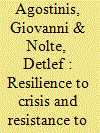

|
|
|
|
|
| Summary/Abstract |
Latin American regionalism displays a long history of crises, which have affected almost all regional organisations (ROs) across different waves of regionalism. The article conducts the first comparative analysis of the outcomes of crises in Latin American ROs across time, tackling the following questions: What have been the outcomes of the crises faced by Latin American ROs? Under what conditions does a crisis result in the survival or breakdown of the affected RO in Latin America? We adopt a multi-method approach that combines QCA with process tracing to identify the causal pathways to the survival or breakdown of ROs across a universe of eight crises. The findings show that Latin American ROs have been resilient to crises, which resulted in RO survival in seven cases out of eight. The QCA reveals how the distributive nature of interstate conflicts and the availability of majority voting are both sufficient conditions for Latin American ROs to survive a crisis. Analysis of the outlier case of UNASUR shows that normative conflicts that take place in the absence of majority voting constitute a ‘perfect storm’ configuration that can lead to RO breakdown. The findings also show that Latin America ROs’ tendency to survive crises is associated with the preservation of the status quo in terms of institutional design, which in some cases is achieved through the temporary flexibilisation of existing rules. Differently from the case of the EU, then, the crises of Latin American ROs have not led to the deepening of regional integration, but rather to institutional inertia.
|
|
|
|
|
|
|
|
|
|
|
|
|
|
|
|
| 10 |
ID:
118287
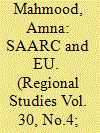

|
|
|
| 11 |
ID:
073517
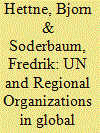

|
|
|
| 12 |
ID:
111540
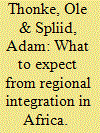

|
|
|
|
|
| Publication |
2012.
|
| Summary/Abstract |
This paper provides a comparative overview of the vast topic of regional integration in Africa. Unlike most literature it includes both security and economic aspects of regional integration. Overall, three mega-trends working in Africa currently will increase the conflict potential in the coming decades unless economic transformation takes off and millions of new jobs are created. Meeting the challenges in the medium term, regional integration is a wise strategy, since it has the potential to deliver conflict mitigation and economic development. The Regional Economic Communities (RECs) in Africa are diverse, dynamic and on different levels of development. Some have progressed tremendously while others have been stalling for decades. As such, they will deliver differently. The vision of a Pan-African Economic Community is not likely to be realised before the deadline of 2028. However, in regions where economic and/or security interests converge and challenges are handled, the RECs may be at similar and in some aspects more advanced levels than the EU of today.
|
|
|
|
|
|
|
|
|
|
|
|
|
|
|
|
|
|
|
|
|